The Wheatleys: Cathy, Keith,
Ted, Elsie & baby Helen, RIP
Originally from Kilkenny city, Cathy is married to Keith and they live on their farm in Co Wicklow with their twins, Ted and Elsie, who are 18 months old.
“I got pregnant with my first baby and unfortunately at seven months my uterus spontaneously ruptured and baby Helen died.”
Cathy lost five litres of blood and had to be resuscitated. The resulting damage to her uterus meant that, despite numerous rounds of IVF treatment, surrogacy was going to be the Wheatleys only option to have a family.
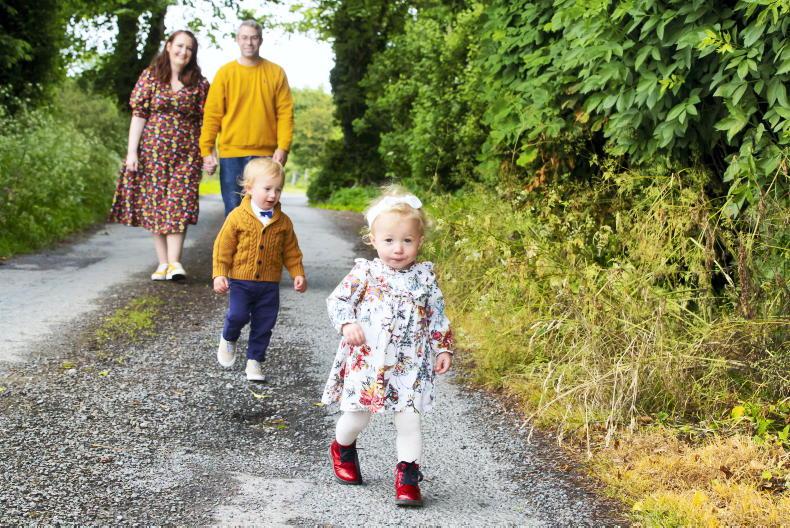
The Wheatleys travelled to Ukraine for their surrogacy. \ Patrick Browne
“We didn’t know anyone who had done surrogacy – celebrities and things like that – but not ordinary people. We were worried about what people would think but when we talked to Keith’s dad who’s a farmer, he was like: ‘Sure that’s going on for years and we do that on the farm.’ It was so funny to see how he just accepted it, understood it. We actually found the farming community so supportive of us”.
Cathy tells Irish Country Living that if someone gives birth to a child in Ireland – as a surrogate mother (domestic surrogacy) – the woman who gives birth to the child, even if biologically unrelated, is legally the child’s parent and is the mother on the birth certificate. So in Ireland, when you child is born through surrogacy, you have no rights as the mother.
You follow the law, you follow the exit process and you get to come home with your babies
With international surrogacy, there were two options. The first was the US, but the Wheatleys couldn’t afford to go to America. The second was Ukraine.
“In Ukraine,” Cathy explains, “we are both recognised as parents to Ted and Elsie. From the minute the child is born, we’re on their birth cert as being their mother and father – there’s no grey area. You follow the law, you follow the exit process and you get to come home with your babies.”
Tummy mummy
Cathy and Keith have a great relationship with Ivana who was the surrogate, or as she is referred to in Cathy’s family “the tummy mummy”.
“When we went to the Ukraine my eggs didn’t work so we went ahead with donor eggs,” she says.
“We speak to Ivana a lot and we video called during lambing. It’s amazing how universal things are.
“We brought them over little Shaun The Sheep gifts (Ivana has two little boys) – we are from a sheep farm so we just brought them sheep gifts and when they saw them they were like: ‘Shaun The Sheep, Shaun The Sheep’. We just found ways to communicate with them.
Cathy speaks freely to Ted and Elsie about their tummy mummy, explaining about mummy’s tummy being “broken” and needing a lovely lady to give a loan of her tummy, telling us: “When you break it down to the most basic level to explain it to kids, that’s really all it is.”

The Wheatleys are still in contact with Ivana, the surrogate mother. \ Patrick Browne
Since May 2020, a same-sex female couple are recognised as both being legal parents to their children [commencement of the Child and Family Relationships Act, 2015].
“In that regard, there has been a donor too, of sperm, but the donor isn’t taken into consideration. It’s about who the legal parents are, or the ‘intended parents’. This is not the case for heterosexual couples or male gay couples who have a child through surrogacy,” Cathy clarifies.
Before leaving Ukraine, the children were DNA tested to confirm that they are Keith’s children. This is important for them to get their Irish citizenship. The issue arises at this point, explains Cathy.
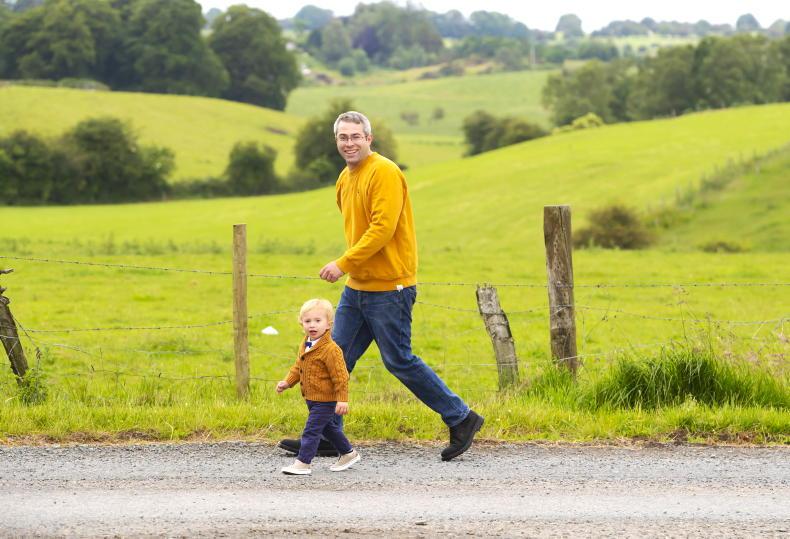
Keith and Ted on the farm in Wicklow. \ Patrick Browne
“At the same time, Ivana gets a DNA test done to show that they’re not genetically related to her. She’s called a gestational carrier, so whether it was my egg or somebody else’s, Ivana is not in any way related to them, but under Irish law she is their mother.
As Cathy is not recognised as their mother, there are issues with inheritance. Sadly, she reflects that: “If Keith dies in the morning, God forbid, I inherit the farm but I can’t leave the estate to Ted and Elsie [with the same legal and revenue conditions as other parent/child relationships], because they are legal strangers to me, so they have to pay full inheritance tax.”
The Lynches: Gillian, David, Hugh and baby Emily, RIP
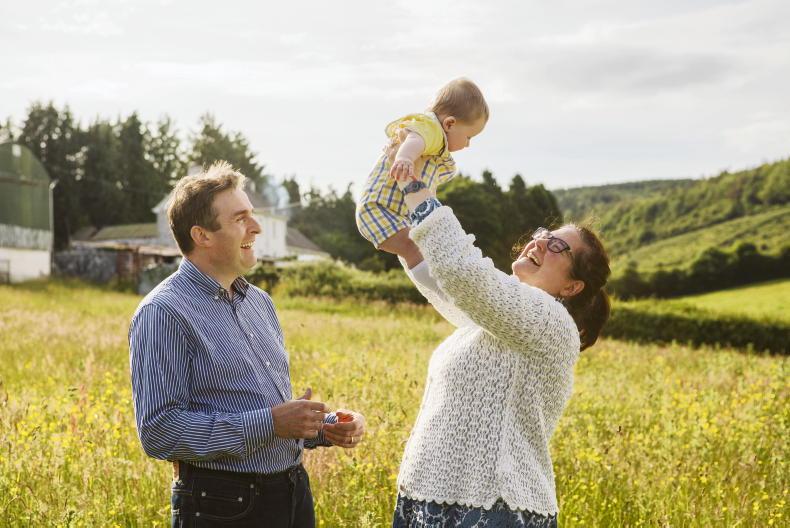
Gillian, David and Hugh Lynch on their farm. \ Claire Nash
Gillian is married to David, and although both work off the farm, a move back to the farm in Laois is happening very soon. Gillian suffered years and years of miscarriages, had a very late-term stillborn baby in 2017, a horrific time with endometriosis and a cancer scare.
Two years ago, after much IVF, the late-term losses and with a “devastating miscarriage” in the summer of 2019, they realised that carrying a baby to term was not going to be possible.
All this, for Gillian, is very hard to talk about as it’s still so traumatic. Despite this, she will not be deterred from getting rights put in place for her baby son.
Primal instinct
Gillian and David decided that the only way they would ever be able to have a family was through surrogacy. “It’s a primal instinct, you just really want to share your life.
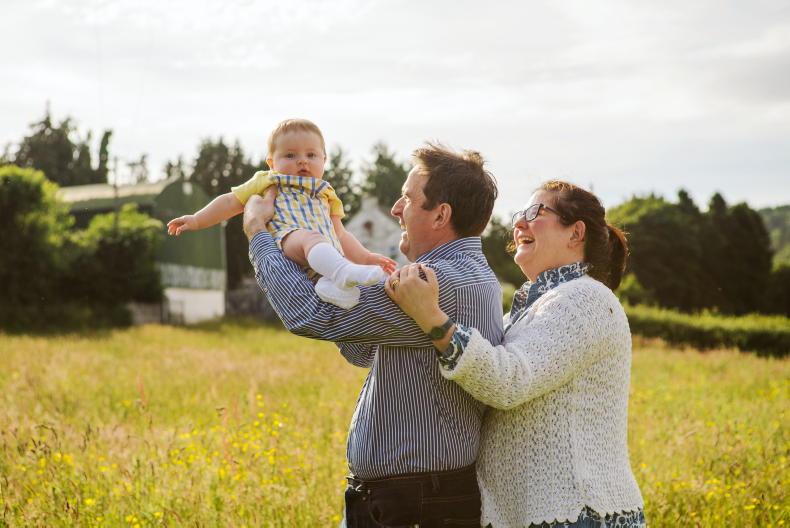
The Lynches decided on surrogacy after many failed rounds of IVF. \ Claire Nash
“We organised a meeting with Annette (Hickey, solicitor with Poe, Kiely Hogan, Lanigan Solicitors, Kilkenny) and [speaking with her] we knew that it was going to be possible, extremely expensive and stressful and everything but possible. So we went down that road. And we were just so so blessed that our beautiful baby – Hugh – was born in December. He is here beside me and he has changed our lives in so many ways.”
Gillian and David’s surrogate was “a wonderful lady called Tetiana in Ukraine, and we still keep in touch with her. Initially the whole focus of the journey of course was to get Hugh, to have a healthy baby and to get home safely.”
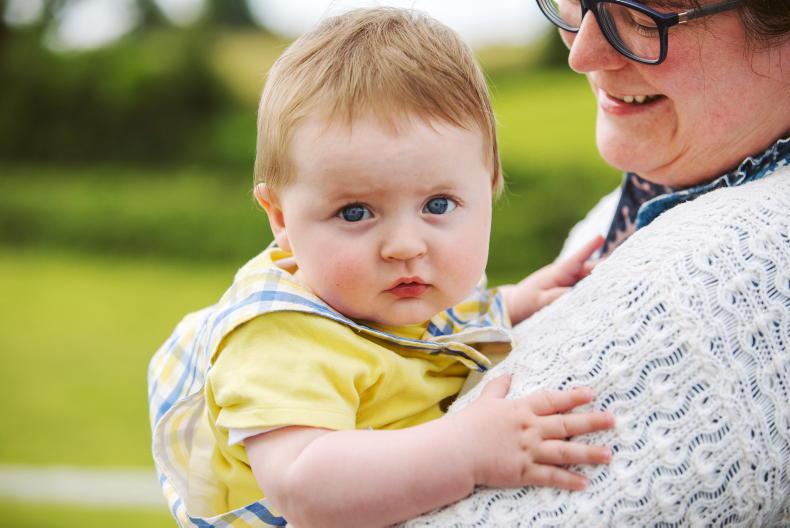
Baby Hugh with mother Gillian. \ Claire Nash
When they were in Ukraine, everything was legal. Gillian is recognised as Hugh’s mother and before being allowed to leave the country, David is confirmed through DNA as the father. They were issued with emergency travel documents from the consulate and on 16 January, the family of three returned home.
Legal stranger
But, Gillian articulates: “From the moment I set foot on Irish soil I am a legal stranger to Hugh – not his mother. I have no legal relationship with him whatsoever. So Hugh has no mother in the eyes of this State and I am a stranger, which is extremely hurtful and cruel and backward.”
Gillian and David understand the need for the DNA test, with child trafficking being such an issue, but even with this, David still had to go through a court procedure – which is another cost on families to get a parental order – so that Hugh will have one legally recognised parent in the country.
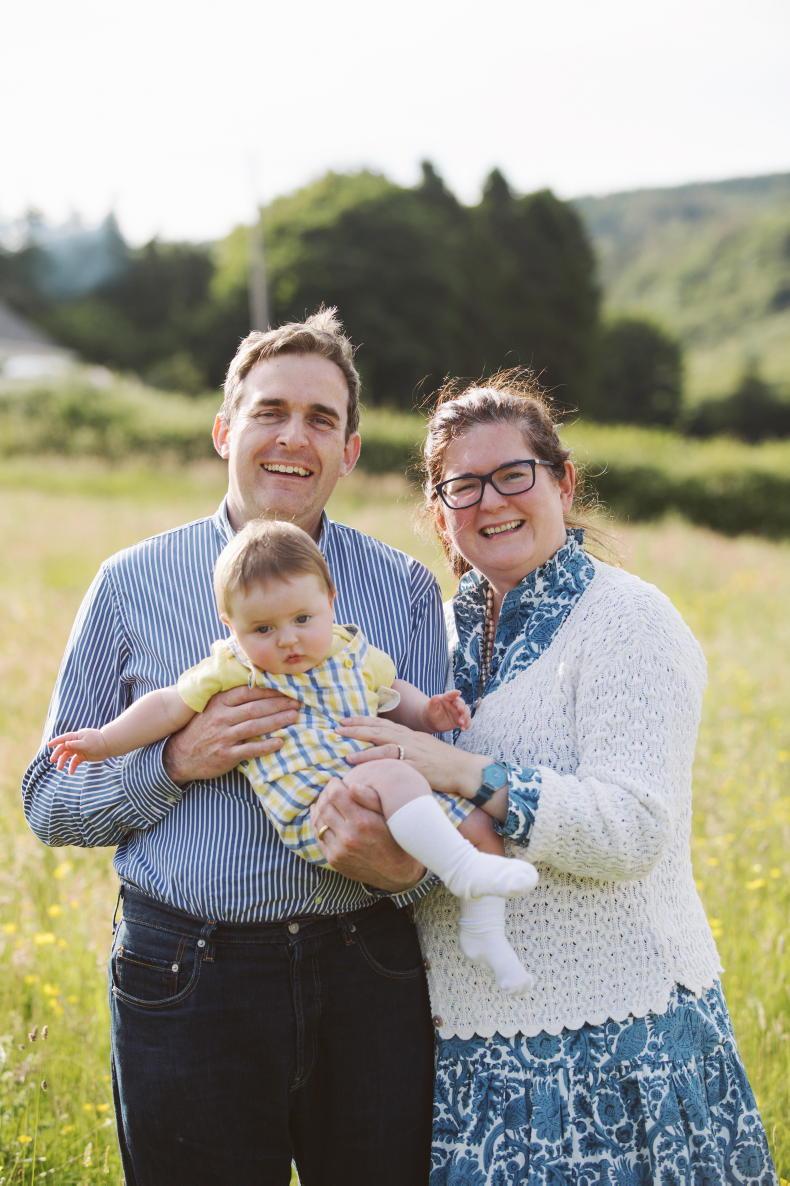
Gillian and David also decided to travel to Ukraine for their surrogacy. \ Claire Nash
But for Gillian, the situation is unchanged: “I am not his mother. After going through everything we went through, after all the years of fertility treatment, the losses of babies – we have a little grave down in Laois for our stillborn daughter, Emily – after everything I come home and I’m not recognised as his mother. I’m not entitled to maternity leave. I have been paying tax for 20 years and I’m not entitled to maternity leave, this is completely wrong.”
No one wants to speak of death but Gillian is frank: “If I was to die in the morning and I wanted to leave any property to my son, Hugh, he would be treated as a stranger in the eyes of the law. So that’s a big issue in terms of farms.”

Gillian, baby Hugh and David on the farm in Laois. \ Claire Nash
Under current legislation, a farmer can nominate a favourite nephew or niece to get an exemption from inheritance tax but children born through surrogacy like Ted, Elsie and Hugh, under the current tax structures, cannot access these benefits. They are also not entitled to many other benefits and Gillian laments that, legally, while acknowledging a hospital will treat a sick child if presented, she does not have the right to consent to any medical treatment for Hugh. She can’t take Hugh out of the country and if anything were to happen to their marriage, Gillian would not be entitled to see Hugh.
Gillian’s final sad comment is that this doesn’t just impact her and David but also her parents, who through this situation are also not recognised as Hugh’s grandparents.
Irish Families Through
Surrogacy
Irish Families Through Surrogacy (IFTS) is a group of Irish parents who have had or are planning to have children through surrogacy. The non-profit organisation is campaigning for their children to have the protection and benefits of a legally recognised relationship with both of their parents.
The often painful journeys to parenthood of the founders is further compounded by the lack of legal recognition and exclusion of Irish mothers in the legal process and the high financial legal costs they face when they arrive home with their newborn babies.
Irish Country Living spoke with Alan Seery, a partner with Kilkenny-based accountants O’Neill Foley.
He explained that Irish inheritance tax legislation defines a child as including:
A step child.or
A child who is adopted in Ireland.or
Adopted outside Ireland but recognised under the Irish Adoption Act 2010. He explained the inheritance situation that the Lynch and Wheatley families find themselves: “Irish inheritance tax legislation does not automatically treat a child born to a surrogate mother as being a child of the mother of a couple. So say, for example, John and his wife Mary use a surrogate mother to birth a child (Eoin) where John is the biological father. If John left his farm to Mary when he passed away, that inheritance by Mary would be exempt from inheritance tax. However, if Eoin inherits the farm from Mary in due course, he would not automatically be treated as a child of Mary.”
Tax liability
To avoid being treated as a “stranger” of Mary for inheritance tax purposes, and potentially having a much higher inheritance tax liability, Eoin would have to show to the “satisfaction of Revenue” that he had lived with Mary for a continuous period of five years in the first 18 years of his life and was maintained and cared for by Mary during that five years.
Furthermore, “He would have to get corroborated testimony of a third party to confirm this. With people living longer and more transient lives, by the time Eoin comes to inherit he may find it difficult to get someone to confirm the position and there’s also the awkwardness of having to explain to a third party why it is relevant.”
What do the families want?
Revenue
The families want to see this year’s finance bill update inheritance tax legislation (and other tax legislation) to recognise the rights of children born through surrogacy in the same way as any other child.
Legal
According to Annette Hickey, Poe, Kiely Hogan, Lanigan Solicitors: “IFTS are engaging with politicians from all political parties seeking their support for the commencement of the Assisted Human Reproduction (AHR) legislation which includes surrogacy.
They want this legislation to be brought forward in the best interests of their children. It is important that domestic and international surrogacy is included and also, crucially, the retrospective declaration of parentage. Legislation which addresses the rights of their children to legal security and equality before the law.
Read more
Laughter lines and beer lines, an antidote in Monaghan
Equity for women in the workplace has to be more than just being ‘facilitated’
The Wheatleys: Cathy, Keith,
Ted, Elsie & baby Helen, RIP
Originally from Kilkenny city, Cathy is married to Keith and they live on their farm in Co Wicklow with their twins, Ted and Elsie, who are 18 months old.
“I got pregnant with my first baby and unfortunately at seven months my uterus spontaneously ruptured and baby Helen died.”
Cathy lost five litres of blood and had to be resuscitated. The resulting damage to her uterus meant that, despite numerous rounds of IVF treatment, surrogacy was going to be the Wheatleys only option to have a family.

The Wheatleys travelled to Ukraine for their surrogacy. \ Patrick Browne
“We didn’t know anyone who had done surrogacy – celebrities and things like that – but not ordinary people. We were worried about what people would think but when we talked to Keith’s dad who’s a farmer, he was like: ‘Sure that’s going on for years and we do that on the farm.’ It was so funny to see how he just accepted it, understood it. We actually found the farming community so supportive of us”.
Cathy tells Irish Country Living that if someone gives birth to a child in Ireland – as a surrogate mother (domestic surrogacy) – the woman who gives birth to the child, even if biologically unrelated, is legally the child’s parent and is the mother on the birth certificate. So in Ireland, when you child is born through surrogacy, you have no rights as the mother.
You follow the law, you follow the exit process and you get to come home with your babies
With international surrogacy, there were two options. The first was the US, but the Wheatleys couldn’t afford to go to America. The second was Ukraine.
“In Ukraine,” Cathy explains, “we are both recognised as parents to Ted and Elsie. From the minute the child is born, we’re on their birth cert as being their mother and father – there’s no grey area. You follow the law, you follow the exit process and you get to come home with your babies.”
Tummy mummy
Cathy and Keith have a great relationship with Ivana who was the surrogate, or as she is referred to in Cathy’s family “the tummy mummy”.
“When we went to the Ukraine my eggs didn’t work so we went ahead with donor eggs,” she says.
“We speak to Ivana a lot and we video called during lambing. It’s amazing how universal things are.
“We brought them over little Shaun The Sheep gifts (Ivana has two little boys) – we are from a sheep farm so we just brought them sheep gifts and when they saw them they were like: ‘Shaun The Sheep, Shaun The Sheep’. We just found ways to communicate with them.
Cathy speaks freely to Ted and Elsie about their tummy mummy, explaining about mummy’s tummy being “broken” and needing a lovely lady to give a loan of her tummy, telling us: “When you break it down to the most basic level to explain it to kids, that’s really all it is.”

The Wheatleys are still in contact with Ivana, the surrogate mother. \ Patrick Browne
Since May 2020, a same-sex female couple are recognised as both being legal parents to their children [commencement of the Child and Family Relationships Act, 2015].
“In that regard, there has been a donor too, of sperm, but the donor isn’t taken into consideration. It’s about who the legal parents are, or the ‘intended parents’. This is not the case for heterosexual couples or male gay couples who have a child through surrogacy,” Cathy clarifies.
Before leaving Ukraine, the children were DNA tested to confirm that they are Keith’s children. This is important for them to get their Irish citizenship. The issue arises at this point, explains Cathy.

Keith and Ted on the farm in Wicklow. \ Patrick Browne
“At the same time, Ivana gets a DNA test done to show that they’re not genetically related to her. She’s called a gestational carrier, so whether it was my egg or somebody else’s, Ivana is not in any way related to them, but under Irish law she is their mother.
As Cathy is not recognised as their mother, there are issues with inheritance. Sadly, she reflects that: “If Keith dies in the morning, God forbid, I inherit the farm but I can’t leave the estate to Ted and Elsie [with the same legal and revenue conditions as other parent/child relationships], because they are legal strangers to me, so they have to pay full inheritance tax.”
The Lynches: Gillian, David, Hugh and baby Emily, RIP

Gillian, David and Hugh Lynch on their farm. \ Claire Nash
Gillian is married to David, and although both work off the farm, a move back to the farm in Laois is happening very soon. Gillian suffered years and years of miscarriages, had a very late-term stillborn baby in 2017, a horrific time with endometriosis and a cancer scare.
Two years ago, after much IVF, the late-term losses and with a “devastating miscarriage” in the summer of 2019, they realised that carrying a baby to term was not going to be possible.
All this, for Gillian, is very hard to talk about as it’s still so traumatic. Despite this, she will not be deterred from getting rights put in place for her baby son.
Primal instinct
Gillian and David decided that the only way they would ever be able to have a family was through surrogacy. “It’s a primal instinct, you just really want to share your life.

The Lynches decided on surrogacy after many failed rounds of IVF. \ Claire Nash
“We organised a meeting with Annette (Hickey, solicitor with Poe, Kiely Hogan, Lanigan Solicitors, Kilkenny) and [speaking with her] we knew that it was going to be possible, extremely expensive and stressful and everything but possible. So we went down that road. And we were just so so blessed that our beautiful baby – Hugh – was born in December. He is here beside me and he has changed our lives in so many ways.”
Gillian and David’s surrogate was “a wonderful lady called Tetiana in Ukraine, and we still keep in touch with her. Initially the whole focus of the journey of course was to get Hugh, to have a healthy baby and to get home safely.”

Baby Hugh with mother Gillian. \ Claire Nash
When they were in Ukraine, everything was legal. Gillian is recognised as Hugh’s mother and before being allowed to leave the country, David is confirmed through DNA as the father. They were issued with emergency travel documents from the consulate and on 16 January, the family of three returned home.
Legal stranger
But, Gillian articulates: “From the moment I set foot on Irish soil I am a legal stranger to Hugh – not his mother. I have no legal relationship with him whatsoever. So Hugh has no mother in the eyes of this State and I am a stranger, which is extremely hurtful and cruel and backward.”
Gillian and David understand the need for the DNA test, with child trafficking being such an issue, but even with this, David still had to go through a court procedure – which is another cost on families to get a parental order – so that Hugh will have one legally recognised parent in the country.

Gillian and David also decided to travel to Ukraine for their surrogacy. \ Claire Nash
But for Gillian, the situation is unchanged: “I am not his mother. After going through everything we went through, after all the years of fertility treatment, the losses of babies – we have a little grave down in Laois for our stillborn daughter, Emily – after everything I come home and I’m not recognised as his mother. I’m not entitled to maternity leave. I have been paying tax for 20 years and I’m not entitled to maternity leave, this is completely wrong.”
No one wants to speak of death but Gillian is frank: “If I was to die in the morning and I wanted to leave any property to my son, Hugh, he would be treated as a stranger in the eyes of the law. So that’s a big issue in terms of farms.”

Gillian, baby Hugh and David on the farm in Laois. \ Claire Nash
Under current legislation, a farmer can nominate a favourite nephew or niece to get an exemption from inheritance tax but children born through surrogacy like Ted, Elsie and Hugh, under the current tax structures, cannot access these benefits. They are also not entitled to many other benefits and Gillian laments that, legally, while acknowledging a hospital will treat a sick child if presented, she does not have the right to consent to any medical treatment for Hugh. She can’t take Hugh out of the country and if anything were to happen to their marriage, Gillian would not be entitled to see Hugh.
Gillian’s final sad comment is that this doesn’t just impact her and David but also her parents, who through this situation are also not recognised as Hugh’s grandparents.
Irish Families Through
Surrogacy
Irish Families Through Surrogacy (IFTS) is a group of Irish parents who have had or are planning to have children through surrogacy. The non-profit organisation is campaigning for their children to have the protection and benefits of a legally recognised relationship with both of their parents.
The often painful journeys to parenthood of the founders is further compounded by the lack of legal recognition and exclusion of Irish mothers in the legal process and the high financial legal costs they face when they arrive home with their newborn babies.
Irish Country Living spoke with Alan Seery, a partner with Kilkenny-based accountants O’Neill Foley.
He explained that Irish inheritance tax legislation defines a child as including:
A step child.or
A child who is adopted in Ireland.or
Adopted outside Ireland but recognised under the Irish Adoption Act 2010. He explained the inheritance situation that the Lynch and Wheatley families find themselves: “Irish inheritance tax legislation does not automatically treat a child born to a surrogate mother as being a child of the mother of a couple. So say, for example, John and his wife Mary use a surrogate mother to birth a child (Eoin) where John is the biological father. If John left his farm to Mary when he passed away, that inheritance by Mary would be exempt from inheritance tax. However, if Eoin inherits the farm from Mary in due course, he would not automatically be treated as a child of Mary.”
Tax liability
To avoid being treated as a “stranger” of Mary for inheritance tax purposes, and potentially having a much higher inheritance tax liability, Eoin would have to show to the “satisfaction of Revenue” that he had lived with Mary for a continuous period of five years in the first 18 years of his life and was maintained and cared for by Mary during that five years.
Furthermore, “He would have to get corroborated testimony of a third party to confirm this. With people living longer and more transient lives, by the time Eoin comes to inherit he may find it difficult to get someone to confirm the position and there’s also the awkwardness of having to explain to a third party why it is relevant.”
What do the families want?
Revenue
The families want to see this year’s finance bill update inheritance tax legislation (and other tax legislation) to recognise the rights of children born through surrogacy in the same way as any other child.
Legal
According to Annette Hickey, Poe, Kiely Hogan, Lanigan Solicitors: “IFTS are engaging with politicians from all political parties seeking their support for the commencement of the Assisted Human Reproduction (AHR) legislation which includes surrogacy.
They want this legislation to be brought forward in the best interests of their children. It is important that domestic and international surrogacy is included and also, crucially, the retrospective declaration of parentage. Legislation which addresses the rights of their children to legal security and equality before the law.
Read more
Laughter lines and beer lines, an antidote in Monaghan
Equity for women in the workplace has to be more than just being ‘facilitated’












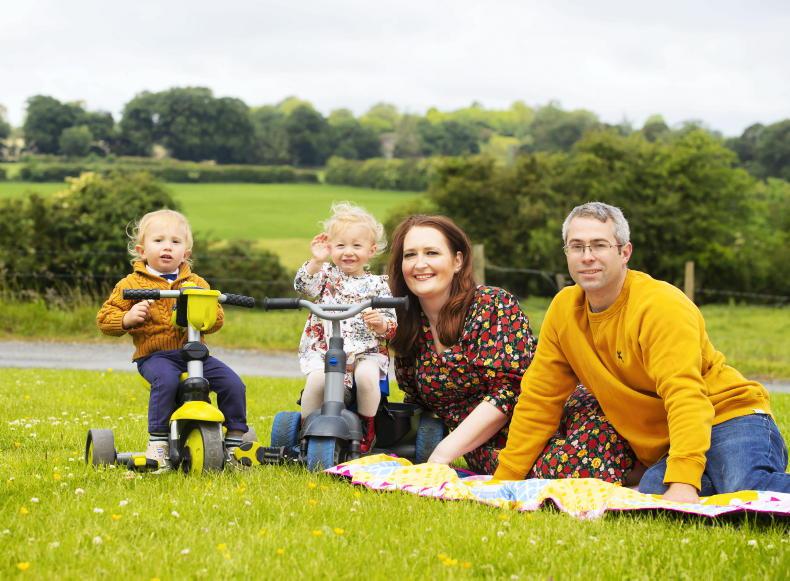


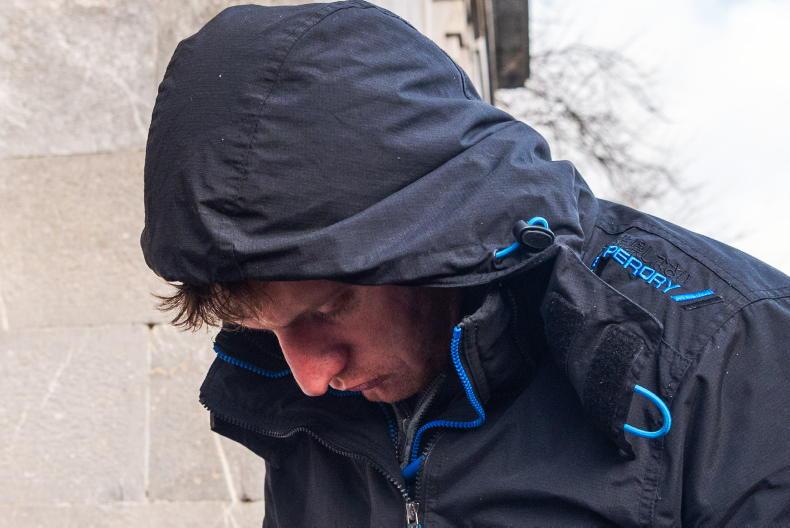
SHARING OPTIONS